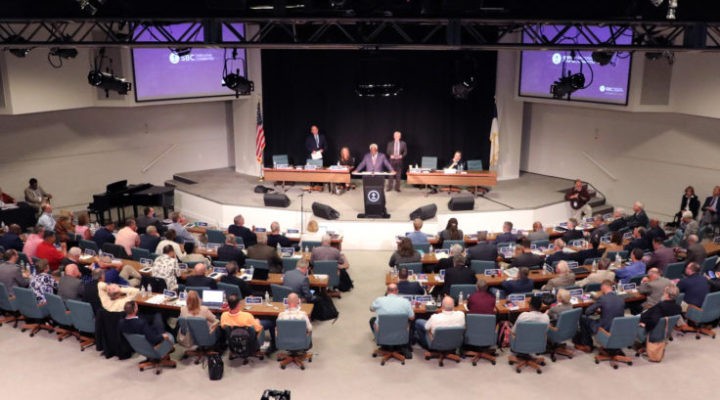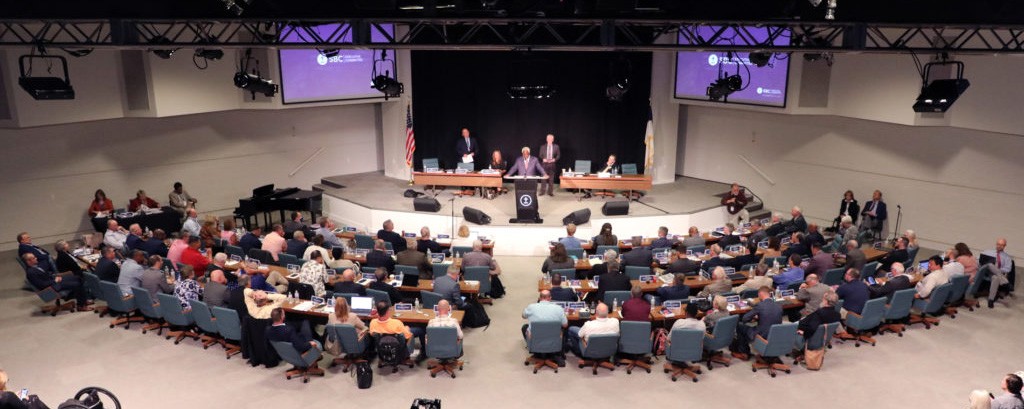On Tuesday, Sept. 21, the single greatest threat to the future of the Southern Baptist Convention since the controversy of the Conservative Resurgence was revealed.
It was not revealed to be a liberal drift, inerrancy versus non-inerrancy, women preachers, the NIV, Calvinism, anti-Calvinism, tongues, Zionism, missions strategies, abortion, or Critical Race Theory, although all these issues are important. No, none of these things came even close to posing an existential threat to the convention in comparison with what took place in Nashville on Tuesday.

David Bumgardner
Instead, what was revealed is that those in whom we as Southern Baptists had chosen to place trust lack moral courage in their ethical reasoning, adequate respect for the will of cooperating churches and common decency for abuse survivors.
How might one identify this offending party? Look no further than the SBC Executive Committee commandeered by its president, Ronnie Floyd, who has lost the respect of many Southern Baptists, along with his motley crew of lawyers and acolytes.
Despite the clear and overwhelming consensus of convention messengers that met in Nashville in June for the SBC annual meeting in the face of an abuse crisis that some may suggest is only rivaled by the Roman Catholic Church, the Executive Committee voted 55-20 against waiving attorney-client privilege in conjunction with the investigation being facilitated with the recently established Sexual Abuse Task Force — which along with convention messengers said such a waiver was essential to ensure transparency in this investigation.
An unprecedented threat
This stunning public display of cowardice can only lead me to believe that the SBC and its leadership in the Executive Committee is emaciated from years of sipping the milk of doctrinal trivialities whilst throwing away the meat of the weightier matters of the law. Floyd and his ragtag band of decrepit legal henchmen have effectively signaled that cooperation in the SBC has ceased to be meaningful.
Floyd and the Executive Committee’s failure to waive privilege poses an unprecedented threat to Southern Baptist polity and, ironically, creates even more potential liability for the convention than what would have been produced from a simple waiving of attorney-client privilege in the first place.
If in previous cases complaints against the SBC were dismissed in view of our lack of hierarchical governance, what will legal experts and judges say in the future when it is revealed that the Executive Committee has effectively overruled the request of its sole member? I shudder to think of the ramifications.
“If motions passed by duly elected messengers from churches attending the annual meeting need not be considered by trustees, why bother opening the convention floor for motions at all?”
The question must be asked: If motions passed by duly elected messengers from churches attending the annual meeting need not be considered by trustees, why bother opening the convention floor for motions at all?
A violation of biblical principles
But what should be of greater concern than this blatant disavowal of our historic polity is the matter of the violation of the biblical principles that undergird said polity.
If an appeal to legal counsel in determining a course of action for a distinctly ecclesiastical endeavor is the foremost and primary concern of trustees, then the New Testament doctrine of ecclesiastical self-governance is violated (see 1 Corinthians 6:4). Put another way, the decision to investigate the Executive Committee was made by the churches represented by the messengers to the annual meeting. This is a decidedly ecclesiastical matter, and while trustees certainly function in legal capacities, their primary duty is not to their specific entity, but to the churches.
Legal counsel is entirely irrelevant to this doctrinal and ecclesiastical matter. If abuse is uncovered, then the state has a God-ordained right and obligation to intervene, and the churches are commanded to disclose such information to and cooperate with the civil power.
“If abuse is uncovered, then the state has a God-ordained right and obligation to intervene, and the churches are commanded to disclose such information to and cooperate with the civil power.”
‘If pickles have souls’
Pertinent to this discussion and of particular interest to me were comments made by Adam W. Greenway, president of the Southwestern Baptist Theological Seminary and Texas Baptist College, where I am currently enrolled as a student. In his report to the Executive Committee and in response to an essay recently published by BNG, Greenway shrewdly alluded to the infamous words of the well-beloved, late and great Adrian Rogers: “If Southern Baptists believe that pickles have souls, then the Southern Baptist seminary professors must teach that.”
I stand in wholehearted agreement with my president that the Bible is verbally and plenarily inspired by the Holy Spirit — that it is the very word of God. Someone once said that trust is the currency of cooperation, and Southern Baptists should be grateful that their academic institutions are held accountable through our trustee system of governance and the Baptist Faith and Message.

File photo of Adrian Rogers preaching at an SBC meeting in the late 1970s.
While Adrian Rogers’ colorful comment was both humorous and memorable, he had a point: SBC agencies and institutions must follow the will of the convention.
I felt immense gratitude and found myself giving a resounding “Amen!” to President Greenway’s remarks (as is often my habit in campus chapel), and I suddenly had an epiphany: If Southern Baptists expect confessional fidelity, transparency and a healthy respect for the will of the messengers from their seminaries, how much more ought we to expect the same of the entity that acts on the convention’s behalf ad interim?
If Southern Baptists were led to believe pickles have souls, then we would certainly expect our seminaries to teach what the convention has affirmed. If Southern Baptists ask the Executive Committee to distribute to our entities the monies given through the Cooperative Program, we would expect them to do so. For that matter, Southern Baptists could ask Executive Committee members to show up to their meetings dressed up as the mascots of their favorite college football teams. Any form of polity that professes to be democratic and representative but, in practice, is subject to the whims of denominational executives is, put simply, chicanery.
In the humble opinion of this Southern Baptist, if convention messengers request their trustees to jump, the only proper response is, “How high?”
Broken trust and the gospel
The nature of the request is irrelevant. The moment the will of the messengers is ignored and subjugated to the scrutiny of denominational elites because of inconvenience, popularity or even potential legal complications, trust is immediately broken. This would be the case if we believe pickles have souls, and it is the case now in the face of Southern Baptists’ vote for an independent investigation of the Executive Committee according to current best standards and practices, which includes, but is not limited to, the voluntary waiving of attorney-client privilege in their capacity as Executive Committee members and staff.
But, to quote former Ethics and Religious Liberty Commission President Russell Moore, when he was asked about his commission’s commitment to religious liberty, the bigger issue here is not merely self-interest, but the Christian gospel.
“The bigger issue here is not merely self-interest, but the Christian gospel.”
A body of believers can profess an incorrect view on baptism but still be a Christian church. They can likewise hold to an errant view of the Lord’s Table, but they will still be a Christian church. Their polity can be congregational, presbyterian or episcopal; their status as a Christian church does not depend on these things.
However, if Southern Baptists believe, in the words of our confession, that a Christian church is “associated by covenant in the faith and fellowship of the gospel; observing the two ordinances of Christ, governed by his laws, exercising the gifts, rights and privileges invested in them by his Word, and seeking to extend the gospel to the ends of the earth,” then we cannot enable, cover up, facilitate or tolerate sexual abuse and still be a Christian church.
Abuse nullifies covenants
Abuse nullifies covenants. It destroys gospel fellowship. It perverts the preached word of God and distorts the meaning of the ordinances. It is a repudiation of the law of love. It threatens and hampers our participation in God’s mission. And, most of all, it forfeits any claim to the rights, privileges and comforts of the gospel.
Southern Baptists have made it clear that it is our opinion that abusers are permanently disqualified from Christian ministry. If our Bible sufficiently condemns abuse as a grievous sin before God, it most certainly also condemns those who give approval to abuse (Romans 1:32).
In the coming days, I plan to write on practical and actionable steps Southern Baptists can take to rectify this disastrous and embarrassing situation. But do not be mistaken: This fight is not primarily about polity. This is, most fundamentally, a fight over what it means to be a gospel people.
The Apostle Paul wrote under the inspiration of the Spirit that a little leaven leavens the whole lump. It is high time Southern Baptists cleansed the leaven by removing such evil people from our midst (1 Corinthians 5:6-7, 13).
David Bumgardner is known to those attending this year’s SBC annual meeting as “The A/C Guy” because of his moment of fame at a microphone. He is a 22-year-old senior at Texas Baptist College, theologian-in-training, evangelist and content creator from Fort Worth, Texas. He is passionate about gospel-focused theology and Christ-centered expository preaching. He is a member and minister at Cornerstone Baptist Church in Arlington, Texas, where Dwight McKissic is pastor. Follow him on Twitter @david_bumg.
Related articles:
SBC faces a test of its governance with tug-of-war over sexual abuse investigation | Analysis by Mark Wingfield
SBC Executive Committee hires a firm to investigate itself and report findings to itself


